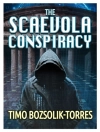In ‘MURDER AT THE PAGEANT, DOWNLAND ECHOES & THE CANON IN RESIDENCE, ‘ Victor L. Whitechurch weaves together a trio of captivating British mystery narratives that embody the rich tradition of early twentieth-century crime fiction. Each story is meticulously crafted, showcasing Whitechurch’s flair for atmosphere and character development. Rooted in the literary customs of the British detective genre, these tales explore themes of social class, morality, and justice, all wrapped within the mystique of seemingly tranquil English settings that conceal darker secrets. Whitechurch’s narrative style balances suspense with intricate plotting, effectively drawing readers into a labyrinthine world of intrigue and deception. Victor L. Whitechurch, a contemporaneous figure to Agatha Christie and Arthur Conan Doyle, possessed a deep fascination for the mechanics of crime and resolution. His background as a railway engineer likely influenced his approach to structuring narratives filled with precision and efficiency. Whitechurch’s keen observational skills were products of both his profession and his varied travel experiences, which are reflected in his vivid descriptions and profound understanding of human nature. This collection is a must-read for aficionados of classic British mysteries, providing an authentic glimpse into the genre’s evolution. Whitechurch’s ability to craft tightly woven plots that still resonate today invites readers to savor the subtleties of each tale, making this anthology an essential addition to any mystery lover’s library.
Sobre el autor
Victor Lorenzo Whitechurch (1868–1933) was an English clergyman and author, recognized for his contributions to the mystery and detective fiction genre. With a refined literary style, he successfully straddled the realms of ecclesiastical duties and literary pursuits. Among his notable works are ‘Murder at the Pageant’, ‘Downland Echoes’, and ‘The Canon in Residence, ‘ which stand as a testament to his narrative dexterity and understanding of the British countryside, often serving as an evocative backdrop for his mysteries. His stories are typified by their intricate plots and engaging characterizations, particularly in the invention of the character Thorpe Hazell, a vegetarian railway detective, which predated other famous fictional sleuths and established a niche for railway mysteries. Besides his mysteries, Whitechurch’s bibliography spans various genres, reflecting a versatile literary capacity. A contemporary of Sir Arthur Conan Doyle, he was a member of ‘The Detection Club’, alongside other luminaries of the mystery genre. Whitechurch’s work endures in the canon of early 20th-century British literature, where his ecclesiastical insights often provide an additional layer of nuance to the moral underpinnings of his detective stories. His contribution to the genre remains noteworthy for its combination of pastoral settings and the intellectual rigor of its puzzles.












